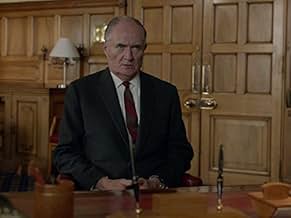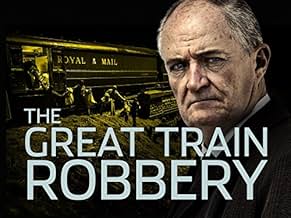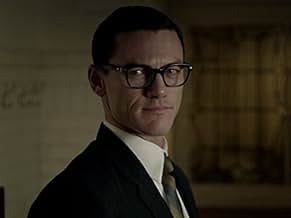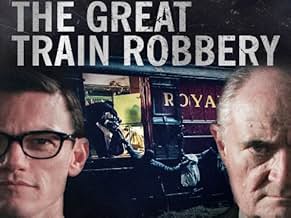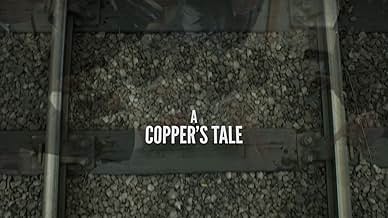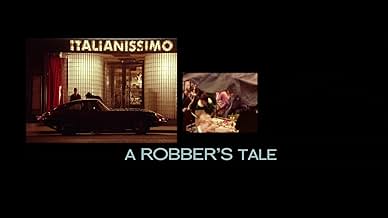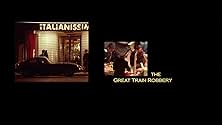NOTE IMDb
7,3/10
5,3 k
MA NOTE
Ajouter une intrigue dans votre langueA two-part drama which portrays The Great Train Robbery of 8 August 1963, firstly from the point of view of the robbers and then from the point of view of the police who set out to identify ... Tout lireA two-part drama which portrays The Great Train Robbery of 8 August 1963, firstly from the point of view of the robbers and then from the point of view of the police who set out to identify and catch the robbers.A two-part drama which portrays The Great Train Robbery of 8 August 1963, firstly from the point of view of the robbers and then from the point of view of the police who set out to identify and catch the robbers.
- Nomination aux 1 BAFTA Award
- 4 nominations au total
Parcourir les épisodes
Avis à la une
I enjoyed this first episode although of course we all know the story. And an important part of the story is that it all happened in August of 1963. Now I was only 4 years old that year so cant quite remember what the summer of '63 was like but I would bet a large amount of money (maybe even 2.1 million pounds)on a couple of things...first there were probably leaves on the trees and secondly it is doubtful that there was snow on the ground and indeed falling in London...in the middle of August!!! What were the producers thinking? During the episode there are several captions giving the date...including the 8th August 1963. Why or why did they create a setting that looked like January or February! There wasn't even any attempt to produce a blue sky! A good film, well acted and written but ruined by the weather! Only in England!!!
This two part drama was a retelling of the The Great Train of 1963. The first part was the Robbers Tale which was a straightforward story of the planning and execution of the robbery.
This was the most fascinating aspect of the drama as over the years, the personalities of some of the robbers (Ronnie Biggs, Buster Edwards) has overshadowed the events of the Train Robbery and the main players involved.
Luke Evans, Martin Compston and Paul Anderson give the best performances.
The second part was the Policeman's Tale and featured Jim Broadbent as DCS Butler, hell bent in getting the gang like the sheriff of an old wild west town which was very much how he was introduced.
This was more procedural and not as interesting or riveting as the first part.
Incidentally both parts had different directors but Butler was just too much of a dullard and Broadbent looks too old to even be playing a cop on the verge of retirement.
Able support by Robert Glenister. It is interesting to see that 'Slipper of the Yard' (played by Nick Moran) who in later years seemed to have been more prominent in the media as the cop hunting the train robbers was a more secondary character in this drama.
Well now Slipper is dead he will not be able to sue for his lack of prominence. In the past when he was alive he was rather quick to shout libel for any slight stain on his character!
This was the most fascinating aspect of the drama as over the years, the personalities of some of the robbers (Ronnie Biggs, Buster Edwards) has overshadowed the events of the Train Robbery and the main players involved.
Luke Evans, Martin Compston and Paul Anderson give the best performances.
The second part was the Policeman's Tale and featured Jim Broadbent as DCS Butler, hell bent in getting the gang like the sheriff of an old wild west town which was very much how he was introduced.
This was more procedural and not as interesting or riveting as the first part.
Incidentally both parts had different directors but Butler was just too much of a dullard and Broadbent looks too old to even be playing a cop on the verge of retirement.
Able support by Robert Glenister. It is interesting to see that 'Slipper of the Yard' (played by Nick Moran) who in later years seemed to have been more prominent in the media as the cop hunting the train robbers was a more secondary character in this drama.
Well now Slipper is dead he will not be able to sue for his lack of prominence. In the past when he was alive he was rather quick to shout libel for any slight stain on his character!
Since the story based on real events is known, I expect the film to be a little more than a purely chronological sequence of the plot. In addition to Luke Evans, the actors are not very prominent and join the monotone pattern. The film could have been more, but in the end it is a boring TV production in my eyes. And after all two long
At the time, the Great Train Robbery was the biggest theft in British criminal history and was as much a part of 1963 here as the Profumo Scandal and the emergence of the Beatles. With the fiftieth anniversary of significant events in that year being commemorated right left and centre (the making of the first Beatles album, the first Dr Who TV show, of course the Kennedy assassination), I guess this notorious occurrence was also too big to miss.
With a large cast consisting of some of the best of British male acting talent (female characters hardly get a look-in), painstakingly accurate set design not to mention the actual train itself, the component parts were all there and waiting to be assembled into place. The imaginative decision to break it into two films, the first part concerning the planning and execution of the crime itself and focusing on the criminal gangs which came together to do the misdeed, the second, the aftermath, concentrating on the police investigation run by Jim Broadbent's tough-as-old-boots D.I Tommy Butler, was, on paper, a good one and for the first half certainly successful.
In part one, we see the scheme being formulated by Luke Fisher's bespectacled (obviously marking him out as the brains) Bruce Reynolds the coordinator of the operation, including the recruitment of the necessary personnel, implementation of the crime and the plan on how to escape the law after the robbery. Pacily directed and well-acted by the whole group, the viewer is completely taken into the criminal world and despite myself, caught up in the anticipation and even excitement as they set about their dirty work. I must admit my distaste at the scene where they realise the enormity of what they've done and celebrate with abandon, even though I knew they didn't get away with it for long.
Which leads onto part two, which I felt was altogether less successful. The narrative changes tack and now follows the police investigation into the crime with Broadbent and his weary men one by one picking off the assembled pictures of the perpetrators on their incident-room notice board. Unfortunately at this point the director decides that Broadbent and his team are the UK equivalent of The Untouchables so that we get endless shots of Broadbent grimly gazing at the camera and when they walk, it's in De Palma-esque slow-motion. All the artifice that was stripped away in the impressive first 90 minutes is overloaded into the second one and while there's still drama in watching all the villains get their come-uppance, you completely lose the sense of authenticity built up thus far. The soundtrack was confusing too, quite why 50's Frank Sinatra songs proliferate, I can't tell and for some reason the great Spencer Davis Group song "I'm A Man", cut in 1966 gets played as the background to events from three years before. The use of Nina Simone songs, especially "Sinner Man" did work better but again, like the overall production, they only got this part half-right too.
I almost thought that the two parts must have been directed by two different directors but no, it was just poor execution of a good plan, sort of like how the robbers handled their getaway.
With a large cast consisting of some of the best of British male acting talent (female characters hardly get a look-in), painstakingly accurate set design not to mention the actual train itself, the component parts were all there and waiting to be assembled into place. The imaginative decision to break it into two films, the first part concerning the planning and execution of the crime itself and focusing on the criminal gangs which came together to do the misdeed, the second, the aftermath, concentrating on the police investigation run by Jim Broadbent's tough-as-old-boots D.I Tommy Butler, was, on paper, a good one and for the first half certainly successful.
In part one, we see the scheme being formulated by Luke Fisher's bespectacled (obviously marking him out as the brains) Bruce Reynolds the coordinator of the operation, including the recruitment of the necessary personnel, implementation of the crime and the plan on how to escape the law after the robbery. Pacily directed and well-acted by the whole group, the viewer is completely taken into the criminal world and despite myself, caught up in the anticipation and even excitement as they set about their dirty work. I must admit my distaste at the scene where they realise the enormity of what they've done and celebrate with abandon, even though I knew they didn't get away with it for long.
Which leads onto part two, which I felt was altogether less successful. The narrative changes tack and now follows the police investigation into the crime with Broadbent and his weary men one by one picking off the assembled pictures of the perpetrators on their incident-room notice board. Unfortunately at this point the director decides that Broadbent and his team are the UK equivalent of The Untouchables so that we get endless shots of Broadbent grimly gazing at the camera and when they walk, it's in De Palma-esque slow-motion. All the artifice that was stripped away in the impressive first 90 minutes is overloaded into the second one and while there's still drama in watching all the villains get their come-uppance, you completely lose the sense of authenticity built up thus far. The soundtrack was confusing too, quite why 50's Frank Sinatra songs proliferate, I can't tell and for some reason the great Spencer Davis Group song "I'm A Man", cut in 1966 gets played as the background to events from three years before. The use of Nina Simone songs, especially "Sinner Man" did work better but again, like the overall production, they only got this part half-right too.
I almost thought that the two parts must have been directed by two different directors but no, it was just poor execution of a good plan, sort of like how the robbers handled their getaway.
This almost documentary style film made for interesting viewing, and this may have been Luke Evans' first leading role, and he grabbed the opportunity with lots of panache. As the leader of the band of robbers who pulled off the heist, I had some difficulty in focusing on who he was as Buster Edwards and Ron Biggs were always better known. The film however did show that this was a big gang of thieves, and this probably led to their undoing. The actual heist took up little screen time, the rest dealt with the dynamic between the gang, and the motivation of the ringleaders apart from the usual greed, is clearly shown. I enjoyed it, there was always the feeling that this was a gang who were in over their heads, and there is one telling moment when they realize it after counting the money.
The early sixties setting with its talk of the war years and exploits of that time is well realized, making this a series to be enjoyed. Martin Compston had a small but significant role as well.
The second instalment is just as fascinating when you are given the opportunity to see the trail of clues the gang left behind them in the old farmhouse, even after 'apparently' cleaning up! A restrained but driven Jim Broadbent gives the sense of urgency the Police felt about solving this crime, and it says much about the actors concerned, that you almost wanted the robbers to get away with it! Perhaps that explains the success of later series like Money Heist which focus on that.
The early sixties setting with its talk of the war years and exploits of that time is well realized, making this a series to be enjoyed. Martin Compston had a small but significant role as well.
The second instalment is just as fascinating when you are given the opportunity to see the trail of clues the gang left behind them in the old farmhouse, even after 'apparently' cleaning up! A restrained but driven Jim Broadbent gives the sense of urgency the Police felt about solving this crime, and it says much about the actors concerned, that you almost wanted the robbers to get away with it! Perhaps that explains the success of later series like Money Heist which focus on that.
Le saviez-vous
- AnecdotesRonald Biggs, one of the last surviving Great Train Robbers, died on 18 December 2013, the same day that this two-part series was first shown.
- GaffesPolice Officers are shown wearing white shirts. In 1963 Constables and Sergeants in all English police forces wore blue shirts. The change to white shirts came in the late 1970s.
- ConnexionsReferences La grande attaque du train d'or (1978)
Meilleurs choix
Connectez-vous pour évaluer et suivre la liste de favoris afin de recevoir des recommandations personnalisées
- How many seasons does The Great Train Robbery have?Alimenté par Alexa
Détails
- Date de sortie
- Pays d’origine
- Site officiel
- Langue
- Aussi connu sous le nom de
- 火車大劫案
- Lieux de tournage
- Sociétés de production
- Voir plus de crédits d'entreprise sur IMDbPro
- Durée1 heure 30 minutes
- Couleur
Contribuer à cette page
Suggérer une modification ou ajouter du contenu manquant

Lacune principale
What is the French language plot outline for The Great Train Robbery (2013)?
Répondre


